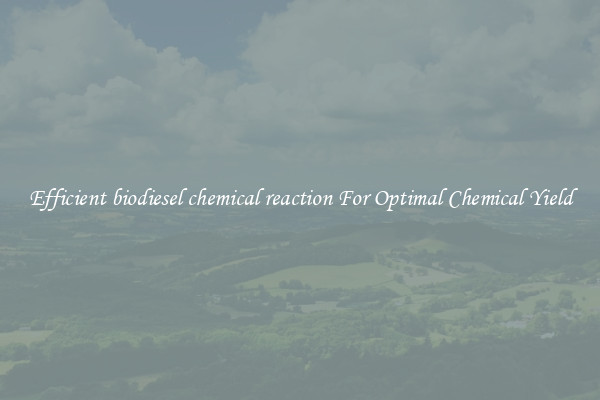Efficient biodiesel chemical reaction For Optimal Chemical Yield
Biodiesel is a renewable fuel source that has gained widespread popularity in recent years as a more sustainable alternative to traditional petroleum-based fuels. One of the key components in the production of biodiesel is the chemical reaction that converts vegetable oils or animal fats into biodiesel fuel through a process known as transesterification. However, maximizing the chemical yield of this reaction is essential in order to ensure the efficient production of biodiesel.

Efficiency in the biodiesel chemical reaction is crucial for several reasons. First and foremost, optimizing the chemical yield of the reaction ensures that the maximum amount of biodiesel fuel is produced from a given amount of feedstock, ultimately making the production process more cost-effective. This is especially important in the context of the growing demand for biodiesel as a sustainable fuel source.
Additionally, maximizing the chemical yield of the reaction also helps reduce waste and minimize the environmental impact of biodiesel production. By ensuring that as much of the feedstock is converted into biodiesel fuel as possible, the overall efficiency of the production process is improved, leading to a more sustainable and environmentally friendly fuel source.
There are several factors that can influence the efficiency of the biodiesel chemical reaction and ultimately affect the chemical yield of the process. These factors include the type and quality of the feedstock, the catalyst used in the reaction, the temperature and pressure at which the reaction is carried out, and the mixing and agitation of the reactants.
To achieve optimal chemical yield in the biodiesel reaction, it is important to carefully control these factors and fine-tune the reaction conditions to ensure that the maximum amount of biodiesel fuel is produced. This may involve using high-quality feedstock, selecting the appropriate catalyst, optimizing reaction conditions such as temperature and pressure, and ensuring thorough mixing and agitation of the reactants.
Furthermore, ongoing research and development in the field of biodiesel production are focused on developing new and innovative technologies to further improve the efficiency of the chemical reaction and increase the chemical yield of biodiesel production. By continually refining and optimizing the biodiesel production process, it is possible to further enhance the sustainability and viability of biodiesel as a renewable fuel source.
In conclusion, maximizing the chemical yield of the biodiesel reaction is essential for efficient biodiesel production and the continued growth of this sustainable fuel source. By carefully controlling the various factors that influence the efficiency of the reaction, it is possible to achieve optimal chemical yield and produce biodiesel fuel in a cost-effective and environmentally friendly manner.

View details

View details

View details

View details








